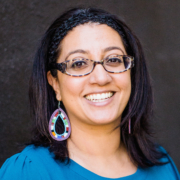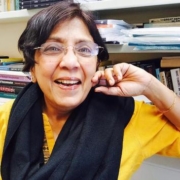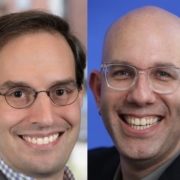Carlos Navia Canales
Reimagining Education in Chile’s New Constitution
In 2020, Chilean citizens voted for their national constitution to be re-written. This was the culmination of mass protests the year before. Now a Constitutional Convention is actively re-writing a new constitution, which will be put to the public for an up or down vote later this year.
With me to talk about the ways in which education is being reimagined in the new constitution is Carlos Navia Canales. Carlos is a lawyer with experience in Human Rights, Constitutional Law, and the Right to Education. He is currently a technical advisor on education to the Socialist Party at the Constitutional Convention. In our conversation, he takes us inside the Convention, detailing some of the debates delegates are having over education.
Citation: Canales, Navia Carlos, interview with Will Brehm, FreshEd, 271, podcast audio, February 28, 2022.https://freshedpodcast.com/navia-canales/
Will Brehm 1:36
Carlos Navia Canales, welcome to FreshEd.
Carlos Navia Canales 1:39
Thank you very much, Will.
Will Brehm 1:40
So, in May of 2020, Chile voted basically to rewrite its constitution. It was overwhelming. Something like 78% of voters voted in support of rewriting the Constitution. What does that actually mean? I mean, that seems quite amazing in a way.
Carlos Navia Canales 1:57
Yeah. This is huge because the current constitutional process started at the end of 2019 with the biggest social demonstrations since the return to democracy. And currently, we are the only country in South America in which constitutions created under dictatorship is still enforced. So, this is a big thing for us.
Will Brehm 2:18
So, this is Pinochet and his constitution?
Carlos Navia Canales 2:20
Yes.
Will Brehm 2:21
And so that was implemented when?
Carlos Navia Canales 2:23
That was created during 1973 to 1980. It was implemented from the early 80’s. So, that’s what we have.
Will Brehm 2:34
That’s the constitution that still exists to this day in Chile. And so, can you describe that sort of current constitution? Like what’s in it? And what are people so concerned about when it comes to that constitution?
Carlos Navia Canales 2:46
This constitution, as I told you, was created under a dictatorship and it was influenced by neoliberalism. So, we can see how the role of the state is reduced in the context of this constitutional regulation. It is possible to see how in terms of social rights, the state doesn’t play an important role or relevant one.
Will Brehm 3:07
So, can you give an example of what that would look like in terms of education?
Carlos Navia Canales 3:11
Yeah. In terms of education, we can see the influence of neoliberalism, at least in two dimensions. Firstly, related to the aims of education. While international agreements state that education is connected to the promotion of human rights or the promotion of democracy, we can see how our political constitution only connects education with the improvement of the general situation of the individuals not within our society. That’s the first thing. The other one: we can see how the Constitution doesn’t regulate, for instance, the quality of education, I mean, as an obligation for the state to provide quality education without discrimination for everyone. I think that we can see those aspects.
Will Brehm 3:55
Those two aspects are in the current constitution. So, in other words, the Constitution of Chile frames education as an individual good and also doesn’t really talk anything about issues around quality education.
Carlos Navia Canales 4:08
The current constitution doesn’t talk about the quality of education. It doesn’t talk about democracy, human rights, Chile nationality. When we talk about education it doesn’t regulate free higher education, which is a commitment of the Chilean state. So, we can see those aspects.
Will Brehm 4:25
And in terms of education, I mean, a few years ago, Chile made the international news for student protests here. I mean, it was just sort of these massive student protests. So, now were these protests in any sense related to what’s in the Constitution currently, when it comes to education?
Carlos Navia Canales 4:42
These social protests are connected with the current constitutional process. Despite the fact that the social demonstrations of 2019 are directly connected to the current constitutional process, we can see how social movements in 2006 and 2011 raised some social demands that are connected to the current constitutional process. And actually, we can see how one of the leaders of those social demonstrations has been recently elected as the new president of Chile -Gabriel Boric who participate in 2011.
Will Brehm 5:15
So, basically, what you’re saying is that these protests from 2006 to 2011, which were very much focused on education, and high fees in universities, for instance, and one of the leaders, Gabriel Boric ends up becoming the president or president-elect of Chile, and the 2019 protests that directly sort of came before the referendum to rewrite the Constitution, all of this leads up to this really important moment of agreeing to rewrite the Constitution. So, to what extent in your mind is education, sort of the impetus behind a lot of these protests that have led to this really historic moment in the country?
Carlos Navia Canales 6:07
Well, I think the problems related to education have been crucial to arrive to this moment. As you know, in the educational field, neoliberalism reduces the role of the state based on the assumption that the market will contribute to improve both the efficiency and the quality of the educational system. But after 40 years, the evidence from Chile shows that neoliberalism has increased the level of inequality and segregation among students from different sociocultural backgrounds. So, the thing is that the students led the social demonstrations in 2006 and 2011. They show how neoliberalism is not only connected to education but also to other social rights. I think that after 10 years, Chilean citizens realized that social demands related to social rights not be satisfied by the legal and political institutions that were developed under the current political constitution.
Will Brehm 7:03
So, here we are in 2022, and just about two years ago there was the vote to rewrite the Constitution. So, what happens after that vote? Like what is the actual process that a country has to go through to rewrite its constitution? How does it actually unfold?
Carlos Navia Canales 7:20
Chile experienced a huge transformation because as I told you, in 2019, we were the only country in South America with a constitution created under a dictatorship -still enforced. And now we have the first Constituent Assembly of the world which is composed by the same proportion of men and women. And we have representatives from native ethnics, which is new in Chile. Of course, this is the first time that in Chile, we can create a political Constitution with participation of citizens. So, this is totally new for us.
Will Brehm 7:53
So, how did these citizens come to work in this convention? Were they elected? Like, how does that actually happen?
Carlos Navia Canales 8:00
Yeah. We had an election and after the election, 155 people were elected to participate in the Constituent Assembly. And they are working in seven commissions, or seven working groups. One of them is human rights and the content of the new regulations of the right to education has been proposed by this Commission of Human Rights. And we are now in a moment in which the entire assembly is discussing the content proposed by the commissions.
Will Brehm 8:32
Okay. So, 150 people get elected, that sort of represent all different walks of life in Chile and across Chile. And they are working together in this constitutional convention to rewrite the Constitution, or write a new constitution based on these seven different commissions and they debate and discuss what’s happening within each of these commissions. And then at some point they must have a new constitution and what has to happen to it?
Carlos Navia Canales 8:59
Well, just expect that we will have a new document -I mean the draft- at the end of June, because the convention will be working until the fourth of July and then we will have a referendum to approve, hopefully, the new document.
Will Brehm 9:18
So, everyone in Chile that is allowed to vote will be able to cast their opinion about this new draft constitution?
Carlos Navia Canales 9:26
Yeah. The main difference because we have -at the end of this process- two referendums that will be held. At the beginning to decide to rewrite as you say, the Constitution. People decide to do it and decide to do it by a mechanism which is their constituent assembly. That’s the first referendum. But the participation in that referendum was voluntary for citizens. And now it’s a compulsory participation to decide if the new document, if the new constitution, will replace the current constitution.
Will Brehm 10:00
That’s incredible. So, everyone in Chile who’s allowed to vote, it will be compulsory to do so when there is the draft constitution ready to be voted on. What an exciting moment in Chile! I mean, and this is sort of separate from Gabriel Boric being elected who is a young, leftist candidate, former student protests leader becoming elected president. I mean, it’s like these two huge moments happening in Chile that will all come to a fore in the next few months, more or less. So, I guess what does it feel like to be in Chile at this moment?
Carlos Navia Canales 10:36
Honestly, it feels cool. Because suddenly, we are a progressive country. We have people who are looking at our country as an example in South America. And fortunately, well, you say that we have two separate processes, I mean, Gabriel Boric as the new president, and the constitutional process but they are connected. I mean Gabriel Boric wants to implement a new political constitution. The other candidate didn’t want to do it. He wanted to maintain the current political constitution. So, that is important. And as you know, the text is one thing, and the implementation is a different of the constitution. So, it’s very important what’s going to happen in the next three or four years with the new president.
Will Brehm 11:19
So, there’s not only this opportunity to rewrite it, there’s also this political will and political power to actually implement it, hopefully. It’s really quite an incredible situation. So, I guess, you know, that in a sense is the context here. What have you been doing, specifically, in regard to this constitutional convention that’s been taking place?
Carlos Navia Canales 11:41
Well, I belong to the Socialist Party. And I think it’s important to mention it. And I think around 17 members of the constituent assembly belong to the Socialist Party, as well. So, I provide advice in terms of the expected regulation of the right to education. I also work as coordinator of the educational research area of the think tank of the Socialist Party. So, I’ve been working on the regulation of the right to education which includes at least two big elements. On the one hand, elements in relation to international agreements, which are not included in the current political constitution. And I also want to recover some elements that belong to the constitutional tradition of Chile, which are missed in the current political constitution. For instance, the importance of public education and the role of the state to provide public education in terms of quality.
Will Brehm 12:38
And so, historically, that was found in older versions of Chile’s constitution, and the Socialist Party wants to see it back in now, in the new one. So, you are sort of sitting behind the scenes in a way at this constitutional convention, working on text, working on ways to shape the Constitution, in terms of education. What sort of debates are there in this convention? Because like you said, the Socialist Party only has 15 seats out of 150. So, I would imagine there has to be a lot of debate and I guess, consensus or majority vote to adopt different perspective. So, what are some of these debates that you can share with us?
Carlos Navia Canales 13:17
Yeah. By the way, in the current composition of the Constitutional Convention, 15 is a good number.
Will Brehm 13:22
How so? What do you mean, it’s a good number?
Carlos Navia Canales 13:24
Because I think that if we consider the artists and organizations from Left Socialist Party, it’s one of the biggest organizations that are represented in their current political constitution.
Will Brehm 13:36
How many parties are there?
Carlos Navia Canales 13:37
Wow. We have a lot of parties. At least we have three main coalition’s: the right, of course, the center left, and the left. In that left, I think that’s the left of Gabriel Boric, the current president. But also, we have in this constitution, people that don’t belong to political parties, and that’s new for us, as well.
Will Brehm 13:58
Which of these different factions is the largest?
Carlos Navia Canales 14:01
The center left, and the left, they are the largest. And they are working together, fortunately, in the majority of subjects, including …
Will Brehm 14:08
Given that context of this convention, what are the debates that you’re seeing unfold when it comes to education specifically? Like, where is their debate?
Carlos Navia Canales 14:17
I think that the debate will be focused on the aims of education. That’s crucial. I told you about the current regulation, it’s too narrow, only the development of individuals but now we want to include democracy, human rights, maybe including nationality, gender solidarity as well. So, that’s important considering the composition of the Assembly 50-50. I think also the obligation of the state to provide education of a good quality, which is new. Also, I think we have to include the instruction in each person’s first language, which will be new in this context. Because if we regulate the three nationality as an element of the Chilean state, that will impact the content of education and the way in which this is delivered.
Will Brehm 15:04
Of those various points, are there disagreements? Like do some of the parties in the Constitutional Convention disagree with, including, human rights education, and gender parity and issues around different language-based educations for different communities across Chile? Like, I mean, are these debated issues? Like are there disagreements?
Carlos Navia Canales 15:27
There are disagreements, but I think that at this stage, the main disagreement is related to the importance of freedom of education, or freedom of teaching because this is the thing, left and the right are involved in this discussion, a big debate about this. Because from my perspective, freedom of education is not a problem itself. Because freedom of education contributes the exercise of the right to education by increasing education projects, okay. And if you want to say it, maybe it contributes to satisfy the requirement of availability. From my perspective, freedom of education is okay.
Will Brehm 16:00
What is freedom of education, by the way?
Carlos Navia Canales 16:02
I think it’s the opportunity, or the possibility, to create new educational projects. And it’s also connected with the right of parents to choose the education of their sons maybe. Because as you know, the state is not always able to provide public education. The private sector is also involved in this aim, and they contribute by creating new educational projects. Considering that it’s not a problem because we need more schools to provide education for everyone. The problem in Chile, is that under the current political constitutional regulations, freedom of education has been interpreted as the possibility of both selecting students by schools and the possibility of making a profit by schools. So, that’s a problem.
Will Brehm 16:54
So, the problem that you see is when private schools that get set up have the aim of actually profiting from education, rather than providing additional access and choice to parents.
Carlos Navia Canales 17:06
Yeah. In the last 10 years, we can see that schools choose students but not parents choosing schools.
Will Brehm 17:13
How does that actually work? How do schools end up choosing students?
Carlos Navia Canales 17:17
They hand select the students. And that’s a problem under the concept of the right to education. Because I think that the extreme interpretation of freedom of education in Chile has lead to: One, schools can choose students, they select students. Second, they define the payments, and we can find different tuitions fees. And the third is that schools can make profits for this. That’s the problem of interpretation of freedom of education.
Will Brehm 17:43
So, the Socialist Party at the Constitutional Convention is trying to say we shouldn’t allow those practices to exist in the new constitution when we talk about freedom of education. So, how do you actually implement those sorts of regulations into a constitution? How do you actually do that?
Carlos Navia Canales 18:02
We have two stages. The first one, of course, is to include this in the short article of education. We can only say very general aspects of this. But the important thing is the second stage when either the Ministry of Education in the new government of Gabriel Boric, or the Congress implement public policies to define this. So, that will be a different scenario.
Will Brehm 18:29
Right. Okay. So, it’s almost like the debate about specific regulations and how things are implemented will take place through the ministry. But I guess, with the article around education, or multiple articles, in this case, is there anything that you can do when you’re in these negotiations, to sort of make sure that the term freedom of education doesn’t get interpreted in this negative sense, from your perspective, that you’ve seen in Chile, historically, since Pinochet, for instance? How can you maneuver the process to make sure you don’t have bad interpretations of freedom of education?
Carlos Navia Canales 19:08
That’s a great point. You can do it, I think, in two different ways. One of them is directly in the article. In the norm of education. And you can say something like, for instance, freedom of education contributes to the exercise of the right to education just to show what is the importance of the right to education and freedom of education.
Will Brehm 19:27
Okay. So, you take freedom of education, and you directly link it to this other idea of human rights?
Carlos Navia Canales 19:33
Yeah. You can say that. Or, for instance, you can also say something like education is a social and universal right. Then it is non-discriminatory and public and private schools have to provide quality of education for everyone with non-discrimination. That could be important. But also, you can do it in a different way, which means that the context of the whole political constitution provides an interpretation when you read or when you analyze the article of education.
Will Brehm 20:03
Is this article on education currently written, or are you still debating the language of that specific article?
Carlos Navia Canales 20:11
It is partially written, partially this is being debated. But I think that within the next two weeks we will have an agreement related to this because now the entire assembly is discussing the draft by every Commission.
Will Brehm 20:26
Has any different group in the assembly raised a point around education that surprised you that you didn’t think of?
Carlos Navia Canales 20:34
For the right parties, it’s very important to maintain the concept of freedom of education as it has been interpreted under the current federal constitution. That’s very important for them.
Will Brehm 20:47
And so, what do you do in that case? Are you trying to build consensus with them? Is that what’s happening?
Carlos Navia Canales 20:53
Yeah. You have to negotiate, of course. But there are certain areas in which it’s not possible to negotiate. For instance, what you can do at this point, is to include freedom of education, which is important for right, but then maybe to say something as what I said before. I mean, the relationship between the right to education and freedom of education. I say this, because there is a part of the left that didn’t want to include freedom of education in the political constitution.
Will Brehm 21:22
That would be sort of the most secure way of ensuring you don’t have those private schools that operate as you perceived it to be so negatively, currently. So, by excluding the term freedom of education, you might not have that problem going forward. So, you’re saying that they weren’t able to cut that from constitutions?
Carlos Navia Canales 21:43
Yeah. So, that’s the point. That’s the result of the negotiation. I mean, you have to include it but then you have to moderate.
Will Brehm 21:50
And within this assembly, do they have to reach consensus? Does every member have to agree to it? Or is it done by a majority vote?
Carlos Navia Canales 21:58
We need 65% of the votes of the members.
Will Brehm 22:03
Okay. So, there’s a lot of coalition’s forming around. I love the stories about specific words being so important, or so consequential and debating every single word that goes into it. And we should say that what you’re doing in terms of the education article is likely happening for all of the other articles as well. Is that right?
Carlos Navia Canales 22:26
Yeah. That’s right. That’s right.
Will Brehm 22:29
So, it’s such an exciting moment. And soon this constitution will be sent off to the public to vote. And so, let’s assume that it gets passed and assume that the new president, Gabriel Boric, will implement a lot of this new constitution. Do you think daily life in Chile is going to change?
Carlos Navia Canales 22:51
Yeah. It’s going to change. But we have to analyze this situation from different perspectives. The first one: the new constitution will come in effect after September. Sometime this year. But then we need a few years to reorganize the current legislation in Chile in order to be coherent with the content of the new political constitution. On the other hand, we need to wait for the implementation of the political constitution by the new president and by the Congress. So, we need new policies that maybe will bring an effect and impact in the next five or 10 years. But still, it is important, this new political constitution, because it’s not only a legal document but also it summarizes the cultural agreements of societies. So, it’s very important to rectify the co-existence, what the Constitution says. And that has a huge impact. I mean, immediate. And on the other hand, I think that this political constitution, because I think that we will have a new one, will contribute to moderate the impact of neoliberalism. And I think that’s the main aim of this political constitution. And I think that we will do that immediately. I mean, we are doing that now with this political constitutional process.
Will Brehm 24:15
Carlos Novia Canales, thank you so much for joining FreshEd. Best of luck with the final stages of this constitutional convention and fingers crossed that this constitution gets approved.
Carlos Navia Canales 24:26
Thank you very much, Will. For me, it’s a pleasure to talk with you.
Want to help translate this show? Please contact info@freshedpodcast.com
Mentioned Resources
Chile’s constitution of 1980 with amendments through 2012
Chile’s political party system
The 2011 Chilean student movement against neoliberal educational policies
Power cages and the October 2019 uprising in Chile
The politics of student protests and education reform in Chile: Challenging the neoliberal state
Making a constituent assembly possible in Chile
Understanding Chile’s constitution-making procedure
Related Resources
What constitution? On Chile’s constitutional awakening
The dual aversion of Chile’s constitution-making process
Challenges facing Chile’s next government: Part 1
Challenges facing Chile’s next government: Part 2
The Chilean constituent process: A computational social science approach
A new beginning? Indigenous peoples in Chile after its bicentenary
The Chilean student movement as public pedagogy
Evolution in freedom? The meanings of ‘free school’ in Chile
The politics of citizenship education in Chile
Understanding inclusive education in Chile
Models of regulation, education policies and changes in the education system in Chile
Chile’s perfect storm: Social upheaval, COVID-19 and the constitutional referendum
Have any useful resources related to this show? Please send them to info@freshedpodcast.com









